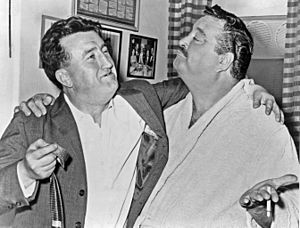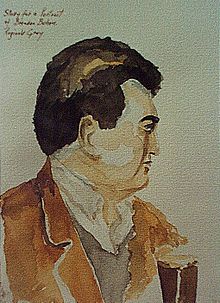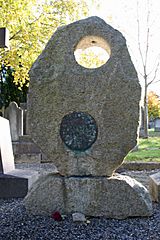Brendan Behan facts for kids
Quick facts for kids
Brendan Behan
|
|
|---|---|

Behan (left) with actor Jackie Gleason in 1960
|
|
| Born | Brendan Francis Aidan Behan 9 February 1923 Dublin, Ireland |
| Died | 20 March 1964 (aged 41) Dublin, Ireland |
| Occupation | Writer |
| Period | 1942–1964 |
| Genre | Poet, novelist, playwright |
| Subject | Irish republican struggle, often autobiographical |
| Notable works | The Quare Fellow The Hostage Borstal Boy |
| Spouse | |
| Children | Blanaid Behan |
| Parents | Stephen Behan (father) Kathleen Behan (mother) |
| Relatives | Dominic Behan (brother) Brian Behan (brother) |
Brendan Francis Aidan Behan (christened Francis Behan) (/ˈbiːən/ BEE-ən; Irish: Breandán Ó Beacháin; 9 February 1923 – 20 March 1964) was an Irish poet, short story writer, novelist, playwright, and Irish Republican activist who wrote in both English and Irish. He was named by Irish Central as one of the greatest Irish writers of all time.
An Irish republican and a volunteer in the Irish Republican Army, Behan was born in Dublin into a staunchly republican family becoming a member of the IRA's youth organization Fianna Éireann at the age of fourteen. There was also a strong emphasis on Irish history and culture in his home, which meant he was steeped in literature and patriotic ballads from an early age. At age 16, Behan joined the IRA, which led to his serving time in a borstal youth prison in the United Kingdom and imprisonment in Ireland. During this time, he took it upon himself to study and he became a fluent speaker of the Irish language. Subsequently released from prison as part of a general amnesty given by the Fianna Fáil government in 1946, Behan moved between homes in Dublin, Kerry and Connemara, and also resided in Paris for a time.
In 1954, Behan's first play The Quare Fellow, was produced in Dublin. It was well received; however, it was the 1956 production at Joan Littlewood's Theatre Workshop in Stratford, London, that gained Behan a wider reputation. This was helped by a famous drunken interview on BBC television with Malcolm Muggeridge. In 1958, Behan's play in the Irish language An Giall had its debut at Dublin's Damer Theatre. Later, The Hostage, Behan's English-language adaptation of An Giall, met with great success internationally. Behan's autobiographical novel, Borstal Boy, was published the same year and became a worldwide best-seller.
By the early 1960s, Behan reached the peak of his fame. He spent increasing amounts of time in New York City, famously declaring, "To America, my new found land: The man that hates you hates the human race." By this point, Behan began spending time with people including Harpo Marx and Arthur Miller and was followed by a young Bob Dylan. However, this newfound fame did nothing to aid his health or his work, with his medical conditions continuing to deteriorate: Brendan Behan's New York and Confessions of an Irish Rebel received little praise.
Contents
Early life

Behan was born in the inner city of Dublin at Holles Street Hospital on 9 February 1923 into an educated working-class family.
His mother, Kathleen Behan, née Kearney, had two sons, Sean Furlong and Rory (Roger Casement Furlong), from her first marriage to compositor Jack Furlong; after Brendan was born she had three more sons and a daughter: Seamus, Brian, Dominic and Carmel.
They first lived in a house on Russell Street near Mountjoy Square owned by his grandmother, Christine English, who owned a number of properties in the area. Brendan's father Stephen Behan, a house painter who had fought in the War of Independence, read classic literature to the children at bedtime including the works of Zola, Galsworthy and Maupassant; their mother Kathleen took them on literary tours of the city. She remained politically active all her life and was a personal friend of the Irish leader Michael Collins. Kathleen published her autobiography, Mother of All The Behans, a collaboration with her son Brian, in 1984.
Brendan Behan wrote a lament to Collins, The Laughing Boy, at the age of thirteen. The title was from the affectionate nickname Mrs Behan gave to Collins.
Behan's uncle Peadar Kearney wrote The Soldier's Song, which became the Irish national anthem Amhrán na bhFiann when translated into Irish. His brother Dominic was also a songwriter, best known for the song The Patriot Game; His brother Brian was a prominent radical political activist and public speaker, actor, author, and playwright.
In 1937, the Behan family moved to a newly-built local council housing scheme in Kildare Road, Kimmage, then seen by Dubliners as the countryside – Stephen muttered that the working classes were being sent "To Hell or to Kimmage" a parody of Oliver Cromwell's demand that the Irish be sent "To Hell or to Connacht". At this stage, Behan left school at 13 to enter apprenticeship to follow in his father's and both grandfathers' footsteps as a house painter.
IRA activities
Behan became a member of Fianna Éireann, the boy scout group of the Anti-Treaty IRA. He published his first poems and prose in the organisation's magazine, Fianna: the Voice of Young Ireland. In 1931 he also became the youngest contributor to be published in The Irish Press with his poem Reply of Young Boy to Pro-English verses.
At 16, Behan joined the IRA and embarked on an unauthorised solo mission to England to set off a bomb at the Liverpool docks. He was arrested while in possession of explosives. British prosecutors tried to convince him to testify against his IRA superiors and offered in return to relocate him under a new name to Canada or another faraway part of the British Commonwealth.
Refusing to be turned, the 16-year-old Behan was sentenced to three years in a borstal (Hollesley Bay, once under the care of Cyril Joyce) and did not return to Ireland until 1941. He wrote about the experience in the memoir Borstal Boy.
In 1942, during the wartime state of emergency declared by Irish Taoiseach Éamon de Valera, Behan was arrested by the Garda Síochána and put on trial for conspiracy to murder and the attempted murder of two Garda detectives, which the IRA had planned to take place during a Dublin commemoration ceremony for Theobald Wolfe Tone. Behan was found guilty and sentenced to 14 years imprisonment.
He was first incarcerated in Mountjoy Prison in Dublin and then interned both with other IRA men and with Allied and German airmen at the Curragh Camp in County Kildare. He later related his experiences there in his memoir Confessions of an Irish Rebel. Released under a general amnesty for IRA prisoners and internees in 1946, Behan's active IRA career was largely over by the age of 23. Aside from a short prison sentence in 1947 for trying to break an imprisoned IRA man out of prison in Manchester, Behan effectively left the organisation, but remained friends with Cathal Goulding.
Writer
Behan's prison experiences were central to his writing career. In Mountjoy he wrote his first play, The Landlady and also began to write short stories and other prose. It was a literary magazine called Envoy (A Review of Literature and Art), founded by John Ryan, that first published Behan's short stories and his first poem. Some of his early work was also published in The Bell, the leading Irish literary magazine of the time. He learned Irish in prison and, after his release in 1946, he spent some time in the Gaeltacht areas of Galway and Kerry, where he started writing poetry in Irish.
During this period he was employed by the Commissioners of Irish Lights, where the lighthouse keeper of Saint John's Point, County Down, recommending his dismissal, described him as “the worst specimen” he had met in 30 years of service, adding that he showed "careless indifference" and "no respect for property".
He left Ireland and all its perceived social pressures to live in Paris in the early 1950s. There, he felt he could lose himself and release the artist within. He managed to earn a living. He returned to Dublin and began to write seriously, and to be published in serious papers such as The Irish Times, for which he wrote In 1953, drawing on his extensive knowledge of criminal activity in Dublin and Paris, he wrote a serial, that was later published as The Scarperer.
Throughout the rest of his writing career, he would rise at seven in the morning and work until noon, when the pubs opened. He began to write for radio, and his play The Leaving Party was broadcast. Literary Ireland in the 1950s was a place where people drank. Behan cultivated a reputation as carouser-in-chief and swayed shoulder-to-shoulder with other literati of the day who used the pub McDaid's as their base: Flann O'Brien, Patrick Kavanagh, Patrick Swift, Anthony Cronin, John Jordan, J. P. Donleavy and artist Desmond MacNamara whose bust of Behan is on display at the National Writers Museum. Behan fell out with the spiky Kavanagh, who reportedly would visibly shudder at the mention of Behan's name and who referred to him as "evil incarnate".
Behan's fortunes changed in 1954, with the appearance of his play The Quare Fellow. Originally called The Twisting of Another Rope and influenced by his time spent in jail, it chronicles the vicissitudes of prison life leading up to the execution of "The quare fellow", a character who is never seen. The prison dialogue is vivid and laced with satire but reveals to the reader the human detritus that surrounds capital punishment. Produced in the Pike Theatre, in Dublin, the play ran for six months. In May 1956, The Quare Fellow opened in the Theatre Royal Stratford East, in a production by Joan Littlewood's Theatre Workshop. Subsequently, it transferred to the West End. The transfer of the play to Broadway provided Behan with international recognition. Rumours still abound that Littlewood contributed much of the text of The Quare Fellow and led to the saying, "Dylan Thomas wrote Under Milk Wood, Brendan Behan wrote under Littlewood". Littlewood remained a supporter, visiting him in Dublin in 1960.
In 1958, his Irish-language play An Giall (The Hostage) opened in the Damer Theatre, Dublin. Reminiscent of Frank O'Connor's Guests of the Nation, it portrays the detention in a teeming Dublin house in the late 1950s of a British conscript soldier, seized by the IRA as a hostage pending the scheduled execution in Northern Ireland of an imprisoned IRA volunteer. The hostage falls in love with an Irish convent girl, Teresa, working as a maid in the house. Their innocent world of love is incongruous among their surroundings. In the end, the hostage dies accidentally during a bungled police raid, revealing the human cost of war, a universal suffering. The subsequent English-language version The Hostage (1958), reflecting Behan's own translation from the Irish but also much influenced by Joan Littlewood bears only a limited resemblance to the original version.
His autobiographical novel Borstal Boy followed in 1958. In the vivid memoir of his time in St Andrews House, Hollesley Bay Colony Borstal, near Woodbridge, Suffolk, England. (The site of St Andrews House is now a Category D men's prison and Young Offenders Institution). An original voice in Irish literature boomed out from its pages.
Behan revered the memory of Father William Doyle, a Dublin priest of the Society of Jesus, who served as military chaplain to the Royal Dublin Fusiliers as they fought in the trenches of the Western Front. Father Doyle was killed in action while running to the aid of wounded soldiers from his regiment during the Battle of Passchendaele in 1917. Behan expressed his affection for Father Doyle's memory in the memoir Borstal Boy. Alfred O'Rahilly's 1920 biography of the fallen chaplain was one of Behan's favorite books.
Personal life
In February 1955, Behan married horticultural illustrator for The Irish Times, Beatrice Ffrench Salkeld, daughter of the painter Cecil Ffrench Salkeld. (Naturally, Dublin wits nicknamed the family the Ffrench Behans.) A daughter, Blanaid, was born in 1963, shortly before Behan's death.
Decline and death
Behan found fame difficult. He developed diabetes in the early 1950s but this was not diagnosed until 1956.
The public wanted the witty, iconoclastic, genial "broth of a boy", and he gave that to them in abundance, once exclaiming: "There's no bad publicity except an obituary." His health suffered, with diabetic comas and seizures occurring regularly. The public who once extended their arms now closed ranks against him; publicans flung him from their premises. His books, Brendan Behan's Island, Brendan Behan's New York and Confessions of an Irish Rebel, published in 1962 and 1964, were dictated into a tape recorder because he was no longer able to write or type for long enough to be able to finish them.
Behan died on 20 March 1964 after collapsing at the Harbour Lights bar (now Harkin's Harbour Bar) in Echlin Street, Dublin. He was transferred to the Meath Hospital in central Dublin, where he died, aged 41. At his funeral he was given a full IRA guard of honour, which escorted his coffin. It was described by several newspapers as the biggest Irish funeral of all time after those of Michael Collins and Charles Stewart Parnell.
Acclaimed Irish sculptor James Power sculpted Brendan Behan's death mask.
Following his death, his widow had a son, Paudge Behan, with Cathal Goulding, Chief of Staff of the Irish Republican Army and the Official IRA.
Works
Plays
- The Quare Fellow (1954)
- An Giall (The Hostage) (1958)
- Behan wrote the play in Irish, and translated it to English.
- Richard's Cork Leg (1972)
- Moving Out (one-act play, commissioned for radio)
- A Garden Party (one-act play, commissioned for radio)
- The Big House (1957, one-act play, commissioned for radio)
Books
- Borstal Boy (1958)
- Brendan Behan's Island (1962)
- Hold Your Hour and Have Another (1963)
- Brendan Behan's New York (1964)
- Confessions of an Irish Rebel (1965)
- The Scarperer (1963)
- After The Wake: Twenty-One Prose Works Including Previously Unpublished Material (posthumous – 1981)
Music
- Brendan Behan Sings Irish Folksongs and Ballads Spoken Arts Records SAC760 (1985)
- The Captains and the Kings
Biographies
- Brendan Behan – A Life by Michael O'Sullivan
- My Brother Brendan by Dominic Behan
- Brendan Behan by Ulick O'Connor
- The Brothers Behan by Brian Behan
- With Brendan Behan by Peter Arthurs
- The Crazy Life of Brendan Behan: The Rise and Fall of Dublin's Laughing Boy by Frank Gray
- My Life with Brendan by Beatrice Behan
- Brendan Behan, Man and Showman by Rae Jeffs
See also
 In Spanish: Brendan Behan para niños
In Spanish: Brendan Behan para niños


